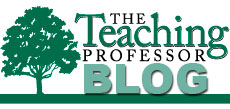Problem solving is “what you do when you don't know what to do."
Read more ›CURRENT ARTICLE • August 31
OTHER RECENT ARTICLES
In the space of one generation, college students have gone from studying with highlighters and wire notebooks to laptops, netbooks and, now, iPads.
Read More ›Retention is a very important issue in higher education right now. It is not difficult to understand why, when you look at the budget constraints most postsecondary schools are currently facing.
Read More › “Feedback by nature must be negative to an extent if it is to be helpful in improving performance. Much of the feedback that instructors give on assignments is to specifically point out the shortcomings of a student’s work and motivate the student toward improvement. Such feedback is intended to be received as ‘constructive criticism.’ However, although students may say they value feedback in general, when it is about their own performance and by extension themselves, the impact on self-esteem may provoke a negative reaction.” (p. 174)
“Feedback by nature must be negative to an extent if it is to be helpful in improving performance. Much of the feedback that instructors give on assignments is to specifically point out the shortcomings of a student’s work and motivate the student toward improvement. Such feedback is intended to be received as ‘constructive criticism.’ However, although students may say they value feedback in general, when it is about their own performance and by extension themselves, the impact on self-esteem may provoke a negative reaction.” (p. 174)
"Why are teachers afraid of sentences that begin with 'I feel' or that draw on personal experience?" Margaret Mott asks, repeating a question she read in an essay early in her career.
Read More ›The debate for “control” of distance education at institutions of higher learning continues. On one side, the administration side, there is a need for centralization of operations, to include course development, instructor training and development, scheduling, evaluation, and student and faculty issues. On the other side of the debate, faculty leaders (deans, department chairs, program coordinators) tend to favor decentralization.
Read More ›Last week I participated in a beginning of the academic year event for faculty. It included a panel of bright, articulate upper-division students.
Read More ›Over the past few years, I have realized that most of the preparation for academic leadership is focused on how to effect institutional change and make a positive difference. These certainly are the "big ticket" items. The truth is, however, that such broad topics don't really hit on the blocking and tackling of daily management. With that in mind, here is a little collective wisdom that may prove especially useful for those who are beginning their journey in academic affairs.
Read More ›Would you let your students decide when you hold office hours?
Read More ›Although they are a fairly recent innovation, most faculty are familiar with teaching philosophy statements. Many have prepared them for job interviews, for promotion and tenure dossiers, for teaching awards, or for personal benefit.
Read More ›




